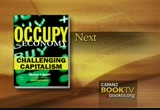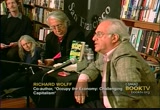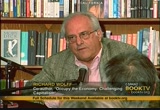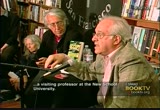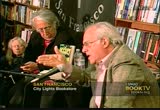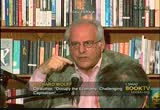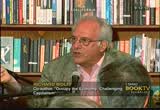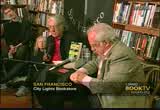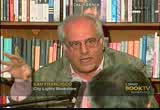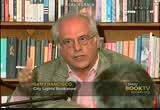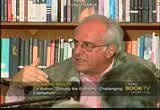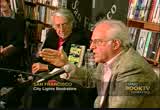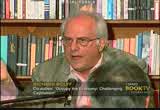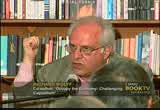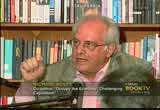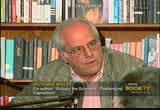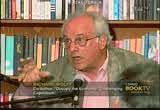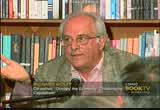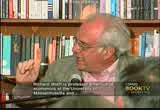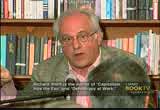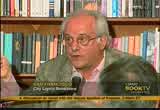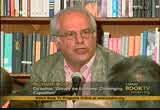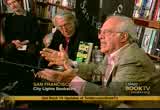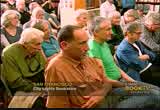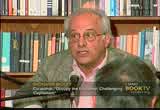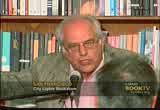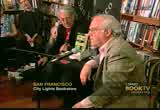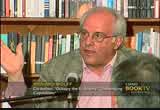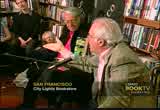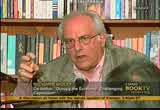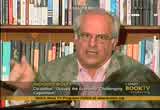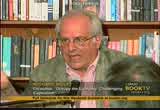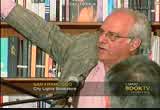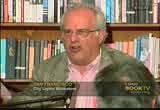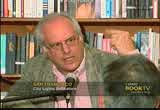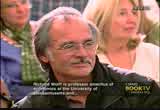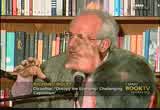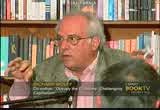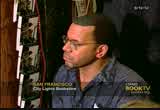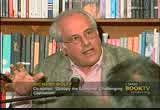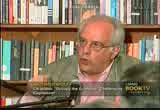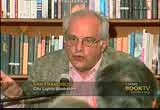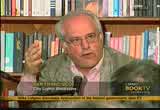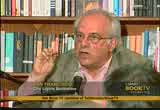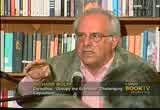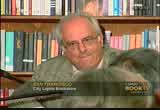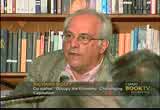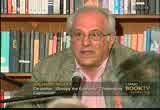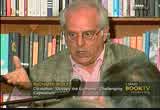tv Book TV CSPAN September 30, 2012 2:00pm-3:45pm EDT
2:00 pm
economic crisis in our jury can be chased in 1970 and system shifted from benefiting fast to the very rich. this is an hour and a half. [applause] >> good to see you out here. let's cut quickly to the chase. what a fitting capitalism's dna that makes it so unstable? >> when you know, since the beginning of economics and the discipline, back in the days of adam smith and david ricardo who were the first to develop it as a comprehensive way of thinking things, economists have worried about that. it has never been, except maybe in the last 30 years the case
2:01 pm
that a significant portion of the public imagined capitalism as anything else. the reality has been from the beginning, wherever capitalism has established itself, it has spends any money unstable. it is all the time feasting on that basis, three to seven years, an economic downturn. i'll give you an example. the last time we had a major collapse of the size we have no was in the 1930s as you all know. there we had a collapsed beginning in 1929 that the symptom until 1940, 41. unemployment rates much higher than we've had so far and this one. that is a terrible disaster to put people back in this country, very far cut back our production on a scale we haven't seen before, et cetera. which you may not always between
2:02 pm
the end of the great depression in 1940, 41, in the beginning of the current disaster, which is dated december 2007, there were 11 more economic downturns. in other words, the system is unstable in an extraordinary way. every few years, millions of people are thrown out of work. huge numbers of businesses collapse. immense amount of production were capable of producing has undertaken a. people without work sit side-by-side with unused tools, equipment, raw materials, preventing us from having an output that can solve many of our social problems. it is a catastrophic problem. i like to explain this to my students as they build a detention, i have a pregnant pause, lean across the podium and say to them, if you've lived as a person is unstable is this
2:03 pm
economic system, you would've moved moved out long ago or demanded they get professional help. and yet you stay in an economic system without the same or a comparable reaction. so it has been clear, even from people who like capitalism that this is a major flaw, a major weakness, a major cause and they try to come up with explanations so far the explanation has not led them to a solution and i want to stress that in response to david's question. for example, where president was franklin roosevelt, every subsequent president has had the unfortunate name to coat, was the president of an unstable system. every president has made the
2:04 pm
same promise to with roosevelt including mr. obama. if you would just follow my policies, these presidents have all said, not only what you get out of the current economic mess but, pregnant pause, we will thereby make sure this kind of economic crash does not afflict her children. every president has promised that no president has yet delivered on that promise. everyone has failed. we can't control it. the monetary policy commences for policy, federal reserve, seamless program. we were supposed to have this crisis. what moore had made to reduce jicama were told by mr. bush advisers that he was just in the housing market subprime mortgage would all work out. they regularly told us the
2:05 pm
federal reserve has just such on the quantitative easing program number three. the reason they pump money for the third time is because the first two didn't work you did recently had to to have multiple stimuli was because they didn't work. so it is a very unstable system. it is not clear what that is about, except that it's very deep, built-in and the reason we know that if every effort to stop it, to prevent it to reflect us has failed. and if you ever wanted -- not that it's the only one, but if you ever wanted one way into the conversation that would question a system pacific displays that kind of instability because you cannot exaggerate the cost. every index of misery goes up with unemployment. that's up album, physical health
2:06 pm
problems, drug addition, i'll call us on her break up of family, alienation is parents and children. you name it, it gets worse with economic downturns. therefore cost is spread into the future. the parents of children unemployed, one of the other other than a community affected by home foreclosures. those children the scars, if you like him in the educational personal development for years to come. every time i hear some conservative politician explained why we haven't got the resources to do something about unemployment. another one of these economic downturns of capitalism. i scratch my head because even the most conservative calculation would indicate the cost of not doing something are larger and not to have been undertaken long ago, just as in this case, not to pursue far
2:07 pm
pushy foreignness, but just as in this case the most stunning thing if you are a normal thinking person, would be to ask yourself, let's see, the last time we had a crisis like this, the last time capitalism's instability took this terrible turn in the 1930s, something very different happened and is happening now. major steps were taken by democratic presidents come and middle of the road are, but suddenly everything changed and he wasn't a big middle of the voter. he suddenly became something else and did a lot of things for the mass of people. none of those are being done now. that is a remarkable difference in the way you handle a bassist and his instability out long ago to have made it necessary if we want a society that was afraid to ask the question, can't we do
2:08 pm
better than an economic system that regularly, relentlessly imposes economic downturns on this? i mean, that's? we have to accept this as if there was a queen on a rainy day instead of saying wait a minute, it is a strange society that would have an economic system or farming like that and not ask that question on a regular basis as part of the basic questioning of how to do better in a community and have an economic system that works like that. >> how is the political class in washington responded to the economic crisis? >> well, i will try to be polite. we have not only an economic system in capitalism that displays the standing instability. we have an economic system that has other qualities that i think
2:09 pm
are equally important in shaping my answer to it the political class is or isn't doing. we have a tendency in capitalism to polarize and come. in other words, the interaction of production and markets, the way they normally work is all kinds of advantages to people who have access and produces disadvantages for people who don't. i'm sure many of you have heard he noticed this. and when you compare your own opportunities to those who have heard he had good ones and have a cumulative something, you understand, even if you don't go through mathematics at the system tends to produce inequalities of outcome. best example would be the last 30 years, a stunning. much the gap between rich and poor has become much more extreme in the united states senate was 30 years ago. if you compare 30 years ago, the united states between rich and
2:10 pm
poor here as opposed to countries of western europe, we were the most egalitarian of countries. now we are the least. we have outstripped everybody else because our capitalism has been relatively robust and when capitalism can do its thing, it polarizes. when it polarizes, it creates an awareness is probably also occurred to you. if a growing number of people are having a hard time in a shrinking number of people are caught an enormous wealth, it will occur to the two of them that this is happening. and in the one group, they may develop a resentment against the othegroup. and if you have a system like capitalism coexisting, not that you have to, but if you have a system of capitalism coexisting with a democratic society in which everyone has evolved, the following insight will occur to a lot of people.
2:11 pm
we, the majority are really getting schooled in the economy. the way to fix it, to reverse that, to offset is use the political system to get that result. in the political system, we can rearrange so what was lost in the economics is indicated more and more unequal is recouped by using politics. where the majority votes, where the majority rules is a perfectly logical way of thinking. and this has occurred to the rich as well. and to the corporations as well. so the more the system produces inequality, the more urgent it becomes for those benefiting from the inequality capitalism producers to control the politics because the alternative would be good. they're not going to do that. they're not going to allow the political system to function
2:12 pm
undoes what they have achieved in their mind in the economic system. they're not going to do that. see you can watch as america becomes more and more unequal, then it becomes necessary for politics to become more and more dependent on the money, dependent on the corporations to provide contributions to the economy, to the party more important than those things, the army of lobbyists shaped what goes on in the normal business of government and perhaps most important, all the think tanks, all those apparatuses sicko amount shaping how we think about the problems of the world, wickets in the media and newspaper. so that is how we'll normalize. the great fear of george lookout years ago called for shaping of common sense or what becomes the commonsense notion is that a neutral matter. it doesn't just flow out of the
2:13 pm
air. a lot of time and effort is spent by people who run the society to shape the common sense notion. and so i think we have a politics that has adjusted to our economic system as he should have expected it to do all along. those folks will not permit as much as they can, they are not going to permit the political system to undo the results of economic system with which they are quite pleased. as long as that happens, you, i am the american people in general going to confront a political system very nicely articulated to oscillate between two parties were differences, but whose differences are not about the basic economic system and neither has the slightest interest in debating that, let alone fundamentally changing it. and that is therefore fine who run the society. it then becomes the coin toss.
2:14 pm
do we like mr. romney? we like mr. obama? do we prefer republicans to democrats? is the system cannot be debated, because everybody agrees the two parties will there be focused elsewhere on things like whether you can have a gun in the back of your truck or whether you do or do not approve of gay marriage, or a whole host of other issues whose importance i am not disputing, but issues get us away from this thorny problem of how economics and politics are articulate and there's a desire to sit in a society that that simply be ruled out of order. >> the five corporations that dominate what people in this country see here and read have perfected the art of propaganda in manufacturing consent while simultaneously criticizing dissent. but i want you to talk about the very origin of this, which could
2:15 pm
be traced to the much revered and in my view, much overrated founding fathers of any political rally. people talk about them in hushed tones. but let's hear what they have to say about these kinds of issues. james madison, who wrote the federalist papers, principle writer of the constitution and president of the united states is straight up the aim of government is to protect the opulent minority against the majority, to protect the minority against the majority. and his colleague, john jay goes one step further. shape in the first president of the constitutional congress, later supreme court justice. he said those that own the country ought to go. so i think we have to see that the origins of this kind of a monopoly capitalism go back right to the very roots of the
2:16 pm
country. >> the irony though is the system of some of his sharpest analects and critics understood is full of contradictions. it is important to be understood not to be arguing because i don't believe that, but this is a system that, for example, somehow solve this problems and presented the united states that can't be overcome, but the system is now so well defended that any hope of changing it is delusional. i don't believe that for one minute. this is a system full of all kinds of problems that it can't solve it is patently obvious. i heard it mentioned one. it doesn't want these crazies over time. these are times of trouble.
2:17 pm
in times of crisis, people are asking questions, which give opportunity for people like me too offering usually answers. this is not useful for the system. that is very important. another example, the worst conceivable thing for the republican party and for george bush going into the year 2007 and 2008 was to end up having to run the next presidential cycle at a moment of severe economic crisis. they would have done -- to do everything they could think of. hire the best economist, pay them a fortune of money, pull out every stop, get every corporation to help in every way not to have that happen. mr. obama was able to arrive into office on the anguish of the american people who blame the republicans for mr. bush does mr. obama saw. the republicans are now trying
2:18 pm
to return this favor and this favor and when they gave the other way. which is the way this is all done. mr. obama did not enter the race in 2012 but the economic crisis going on for years, that's a disaster. the biggest endangerment is campaign phases. i'm so clearly they are not able to control the situation. the idea that it's all under control as i think not only a mistake, but it's a mistake that is suggested often in academic and media circles. i am a professional economist. but hindering us all my adult life as a professor of economics. my friends and associates, people everywhere, disagree with, breadwinners, centris, we all agree this is the worst condition of the american economy and the rest not only have ever seen, but never imagined could happen. we disagree on how it got here
2:19 pm
and what to do, but it is a disaster of unparalleled portions. there is no debate at all, even those on the pay of the political parties on private say that. so there is no question that controlling this economy hasn't worked. it is in many, many ways out of control and that creates opportunities for critics of folks who want to change things and they should never forget that. >> berkshire hathaway has occasionally led the hot out of the bag that his secretary proportionally pays more in taxes than he does. he also ignores class war is waged in the united states in his class is doing it. rather remarkable. i want to talk about events in the euro zone, in europe and how
2:20 pm
that affects the economic crisis here in your visit to mantra god, which is an example perhaps , a successful example of an alternative to the capitalist economic model in spain. >> first a word about warren buffett. derek and i think the contradictory mess of all of this is that play. i'm the one hand yes, there've always been people like him on the side of the wealthy of the big corporations who have a clear understanding that at a certain point it becomes dangerous to keep going in that direction. you cannot keep having a smaller and smaller number of people doing really well in a sea of people who have a harder and harder time. for a while they push it, but don't kill the goose that lays the golden egg in the end.
2:21 pm
so buffett is not the only one. there's a whole bunch of people like that who say that and have the courage or comfort of the security to say it. remember also the same worn faq says that is a major owner of the moody's corporation. in the moody's corporation was a central player in providing aaa ratings for securities we now know were worthless, are worthless, fraudulent and so on. and so, he has said he would himself admit a part of this system and drawn into many entities have brought about the very crisis he now worries, in terms of its consequences. let me turn to europe. we have to be a think as americans a little careful. this crisis is homegrown.
2:22 pm
this is an american crisis. abu appear in 2007, 2008, 2009. during the series is much worse here than anywhere else in the world. europeans looked at the united states, thanks their lucky stars that it wasn't so bad they are as it had been here. this was a mistake of the europeans. they thought with which the father but this is a crisis limited to the united states are peculiar to the united states or maybe peculiar to mortgage finance writing whatever stories they told themselves, stories told in the united states to the very term is still used financial crises as if there was limited to the financial sector publishes the only function i can see for that agitator, everybody. sort of like police departments
2:23 pm
it is worried that if it weren't, it might be part of both lives they lead. you want to put it over there, so financial crisis limited. it is in a financial crisis. it's a general crisis. it is an american. global. it is a financial comments total of four across the board. the europeans have found not to their great dismay. it had become a little moderated here, 2010. interrupts with all the force that had been postponed flick of the season when it finally erupts because you didn't take care two years earlier is worse. so the europeans have suffered the more extreme experience like the united states have earlier.
2:24 pm
they played the same course towards us. we've got it under control. to quote president obama, we are on the long road to recovery. i hope many of you know the weblog was repeated [laughter] because it is a long road since we're nowhere near the end of it. there is a sense we are in recovery, those europeans. so you get bizarre formulations. one example. the europeans are in trouble because they are trying to preserve a danish social democracy, it kind of welfare system which the world can no longer afford and the silly europeans have they not appreciate it that now are paying the price. the detail here is the following, europe is very different.
2:25 pm
northern europe is coming through this crisis very well. germany, for example, is doing much better than united states. the shock over the last few years and basically across the entire crisis. we began at about 5%. we went up to 10% and were now at 85%. that's not a recovery at all. they are one of the best safety minister yuri. their safety net, the provision of services for their people has not been a cause of having a hard time. if anything the logic is to get in the way. scandinavia are famous for the quality of their safety net is to the idea that europe problems is because they have a safety net, requires you not to know much about europe and many commentators qualify.
2:26 pm
having said that, the crisis is very real in europe and i would urge all of you to pay attention because europe is a very, very important player in the world. in many ways, the number one player, the united states is still the biggest country. if you take the market together, smart people in more product. that is a very important part of the world economy, as important as the united states. it is also the place in the world that has had more violent warfare amongst its members over the last century anybody else. two world wars a stupefying destructiveness. it's therefore a continent that is devoted to trying to do something about the severe anxiety they have, just to raise an issue that you might want to debate at some point here at city life bookstore, whether
2:27 pm
there might be an unfortunate connection string capitalism, the dominant system and a scale of warfare is mine pending at the same time. the europeans are terrified. they are tried to build a unity, a unified united states of europe in some ways modeling themselves in the united states. having had common currency for large parts of it, the year of an european commission and european parliaments and moving in that direction. they are now facing an extremely dangerous situation. one part of europe is doing very well. germany, france, northern europe. the rest of europe, particularly the southern areas, spain, italy, portugal, greece. ireland is not southern. hungry communist eastern. and others are in terrible
2:28 pm
shape, serious terrible shape. and because some folks don't pay attention to numbers, here's a chance for a statistic to help you. the professors in your essay cited at my university where he taught in esters at the university of athens, the major university in greece. their salaries today, as we speak, are 40% less than what they were in may 2010. just try to imagine yourself in a job that you have capped in which the money you get, the money you get every week is 40% less. and that is true for all public employees in greece. police persons, fire persons, school teachers, social workers, you name it. so these are societies that are in a major crash. people are leaving greece in a
2:29 pm
way they haven't seen for 75 years. young people, there's no work, no future. his resume in ireland which has a built room for a while, but the irish history and the disintegration of the same unit and likewise in other parts of europe. these are very serious and political implications are staggering because the governments of france and germany have been very frightened since they too are facing an economic crisis and they too are trying to solve that by making the mass of the people say something we can go into. they have chosen to use a very dangerous strategy, particularly in germany. the tragedy goes like this, with the government are your friends, use the german working class because we are not going to allow you to be made to pay for
2:30 pm
those lazy southern european people in greece, spain, italy, all those places where germans got to have vacation. we won't. and they have played a kind of nationalist, almost quasi-racist card and ask him if to be the friend of their own workers because the german workers are very worried about the austerity and europe coming down on them. they see it coming. ..
2:31 pm
>> there are mixed thoughts about the german fellow europeans. those are being rekindled on a scale that should make anyone aware of recent history by reading it. as you can already see, there is a severe conflict in europe, which is you notice in the american press, systematically underreported to science we now
2:32 pm
see a political reaction to the economic crisis of monumental proportions. tweedledum tweedledee, operations between two political parties, very much like republicans and democrats here. what was called the greek socialist party and they would alternate every few years and they would change the. this year, everything increased changed. after the crunched down on the greek people, making them pay for crisis that has nothing to
2:33 pm
do with those and then paid for bailing out the richest folks in greece, etc., the greek people did what no one thought they would. the majority of people did not vote for either of those two parties, trying to understand what it was like to vote for neither the republicans are the or the democrats. in the last two elections, democracy and socialist party together brought under 40% that can bind the vote. an explosive party is the party called the cerise a party. it is a far left-wing party that is against all oesterle programs and wants to solve greece's problems they want to take wealth away from the greek rich.
2:34 pm
they got 27. the only reason that the government agrees now of the right is because of a law for the greece, under greek law, whatever party comes in first, i will take a step back. it has proportional representation. that the reserves a rule of comment. you should have the same percentage of delegates in congress that write the law. 18% of the people while party a, and it will come to deciding what laws get passed. they will effectively screwed
2:35 pm
that in which you would think of the idea. in european countries, we have torsional representation. you get a cut off of 5%. that is how many seats that you get. if you get 51% of the vote, you get it all and the 49% worked. by the way, we have had proportional representation in the united states in the past, and even have it now. when you read about a primary and the vote in some states, and candidate a gets another delegate conventions, that is a proportional representation and they get an equal number of delegates than what they got out of the vote. we actually recognize in the united states proportional representation, we just don't allow these days. one of the reasons for that, if i can be allowed a moment of american history, back in the
2:36 pm
1940s, the city council had elections based on proportional representation. you would get a seat in the city council of new york if you got turn x% of the vote. if you got twice that amount, you got to see spirited a man named ben davis and jim davis won a seat of the city council of new york. you might be interested into aspects of benjamin davis, city council member. he was black, he was an african-american, and he was an enthusiastic public leader of the united states coming in and
2:37 pm
he was elected because of proportional representation. there is another returned to new york city, but we have had it. greece has it. so la cerise got only 3%. they had only 2728%, they came in with 2425%. but under greek law whatever party comes in first not only gets the percentage of the popular vote, but an extra 52 that is only reason one reason they got it by this rule, which is designed to favor the party that comes in first there is a strong, old, deeply rooted
2:38 pm
party, i think they get about 8% of the vote. one third of the voters in greek voted extreme left wing hostility to the capitalist' agrees. that is a sign of greece and a reaction to the change that is taking place. second country, they have had free elections this year. in the first election for the upper house of their national party, the socialist party won for the first time in a half a century. always been controlled by the conservatives, the socialists won a few weeks later, there was a election for president.
2:39 pm
nicolas sarkozy was replaced by françoise hollande, and a few weeks after that, they had the third election for the national assembly, the equivalent to our house of representatives and the socialist swept down. for the first time in many, many decades, the entire french government is controlled by the socialist party. the socialist party ran on the following platform. austerity is not tolerable. they cannot allow the french people to be required to pay the cost of a capital that seems to work. capitalist cannot solve their problems. first the commitments were born, to raise the income tax bracket on the highest earners from its current rate, 45%, compared to the united states, which is 35%. recent from 45% up to 75%, and
2:40 pm
that has been passed. [applause] that has been passed. it has passed in the french parliament because the socialists who opposed it had the absolute majorities in all the houses. the second thing that mr. françoise hollande decided to do is to use some of the money to tax the rich, 40,000 new schoolteachers, across france. now, these are symbolic acts. [applause] the fight is far from over. the wealthy in france are up in arms about all of this. there is all kinds of struggle, it is not clear how far the socialist will go, but the writing is on the wall. europe, unlike the united states, unlike the united states, they never allowed the waves of anti-communism to decimate the organizations that
2:41 pm
have built up their left during the great depression. we had, in the united states, three organizations in the united states that changed everything. the cio, the organized union people -- people at the union in a way that we have never had before or since -- that was the greatest weight of unionization that the united states have ever seen, in the depths of the depression. try to think about the difference between then and now. in the depths of the depression. millions of americans decided that they wanted to join the union. and they did so on a scale we have never seen before or since. the second big organization was the socialist party's multiple party. the third was the american communist party, who are very coordinated with the cio. they overlapped with joint memberships, helped each other, so on, very powerful
2:42 pm
organizations and parallel to what you see in europe. after the war, everything changed. if i can take a moment to explain why, again, the moment of history -- roosevelt comes to power. the depression is already underway for three years. he runs on a balanced budget proposal. this is no radical. he gets into office and everyone around him tells him that economic crisis is worse than anything that they have ever seen, which is very true, and they don't know what to do and it is getting worse. something has to be done. that might have been an interesting conversation, but there were also people marching in the streets on a scale we have never seen before, because of the cio and the socialist and communist who will rally and took over things. there were the struggles that some of you know about when the militias were organized by farmers who informed judges in american courts, but if it
2:43 pm
through any other proud of his or her her home because of the mortgage problem, they would come and lynch the judge, for which they did repeatedly. roosevelt had to call out the national guard. all of this was producing a tender box. finally, when the see -- the cio, when they knew they had a political problem on their hands, first, the cio was representing aggravated, energize workers and unions. but the socialists and the communists who had become very strong, they represented something even scarier, which is a different system. not a demand for helping, but a different system. so roosevelt acted. the story i'm about to tell you is basically what he did.
2:44 pm
he went to the rich and to the corporations. people he knew really well. because that is where he came from. he is a well-connected family. he said to them that you have to give me a lot of money, gentlemen. i mean, really big, because i'm going to have to take care of all of these people you have unemployed. and i tell you, you have to give me the money. because if you don't, the socialist coming down the road are going to cut you a lot worse deal. so, here it is. give me a lot. and he split them. half of them bought it. they agreed the other half never did. the half he won over was enough. he went back to the unions, the cio and the socialist and communist, and he said that we have a deal. i'm going to take care of the
2:45 pm
desperate people in this crisis on a scale that you have never dreamed of. a scale you will not have to pay for. you have to drop all that crap about another system. that has to be quiet. you have to leave the corporations the way that they are the shareholders own the shares, let them select the board of directors upon the company. we'll let that be. and that deal was struck. there were dissenters, of course, but the deal was basically stuck. roosevelt said, okay, hello, americans, here is what i am going to do, number one. i am going to create everyone of you that have done a lifetime of work that is 65 years or older, i'm going to give you money for the rest of your life. every week or month, i'm going
2:46 pm
to give you money. people could not believe it. try to think. old people were in deep trouble. there were no pensions in the state. they have nothing. they were sacrificing their own parents purses and their own children's verses and all that. it was a terrible situation. number two, he says, i have another great idea. it is called unemployment compensation. if you've lost a job, i'm going to give you a check every week and every couple of years. what? yes. and then the third one is the private sector of the united states cannot provide work to the tens of millions of americans who want and need it,
2:47 pm
mr. roosevelt said it is the most natural thing in the world. between 1934 and 1931, depending on how you count, he filmed somewhere between 12 and 21 federal jobs. how do they get this? let me remind you. there is no money, we have to tell old people that we have to wait to get social security for another few years and we can't have the garbage collector that many times. et cetera, et cetera. there is no money, there is no money, there is no money. that was the worst depression. they had no money. of course, they had money. they did all of these things. where do they get their money. the same place where they could get it today. that is not a fanciful left-wing
2:48 pm
idea. that is a historical reality of how it was done. it seems to be effective in getting people to believe. so here is a number. first, 1943, it's the war. the president, roosevelt, he goes on the radio and says to the american people, it is impossible for me as a president to sleep at night. we pay our soldiers who are over there in japan fighting for this and not, $600, i believe, is roughly what they paid them. $600 a year to risk their lives and they were dying in huge numbers. at the same time, we have people in america earning wild amounts of money. so i am going to propose the
2:49 pm
following income tax rate on everybody who earns over $25,000, which is a hell of a lot of money. here is the rate that the president proposed in his message to congress. 100%. i didn't make this up, that is 100%. i'm glad you're enjoying this. [laughter] if we can get more americans to enjoy this, things are going to change the numbers, the republicans, then and now, went
2:50 pm
ballistic with such a suggestion. and there was tremendous struggle. finally, a compromise was reached. the compromise was 94%. yes, smile. this is american history. i did not make any of this up. in 1943, every dollar that everyone in america earned, over 25,000, he or she had to give 94 cents to the government and they got to keep 6 cents. 94% top income tax rate. for those people today, the top rate is 35%. now, you can see how things have changed. things have changed after the war compared to what they were. built up by the struggles of the
2:51 pm
1930s. look at what they were able to do. in 1945, the federal government, which relies on the income tax, the income tax on individuals, businesses for every dollar the federal dollar got from individuals, they got a dollar 50 from corporations. today, for every dollar, that the federal government gets for individuals, gets 25 cents for corporations. over the last 50 years, it is very simple what happened. taxes were shifted for corporations to individuals and from the richest individuals to all of you. i want to say to all of you,
2:52 pm
thank you. [laughter] you are very kind. it's very kind of you. [laughter] to what has been the great tax problem that we have in the united states? we have a political problem and that we are capable and that we are incapable of going and getting the money where it is. and where it has always been and where it was in the 1930s and to get us through that crisis with a lot less suffering than would otherwise have happened then or is happening now. there we are back to europe. the europeans are saying that we will not tolerate this. over the last. not, this has become a very tight issue among your. my guess is that we are going to see the ramifications of this as europe is literally torn apart
2:53 pm
with invocations and reverberations in our society that will touch everyone in this room and everyone watching. >> we would like to get to some questions from the audience. the possibility of a successful cooperative here in the united states, as an alternative to corporate capitalism. >> that is a wonderful question, let me give it some context. what was done in the 1930s was what this dealer described to you, to leave the corporate capitalism alone. to help people with social security, to help with unemployment and help them with jobs. but don't change the system. we have now had 50 years since that to see what the results were. and i think the results are clear. we have lost what was gained
2:54 pm
then. for example, the tax rates that i described to you have all collapsed, which people don't pay what they once did. corporations do not pay what they once did. when it comes to the regulations that were passed in the great depression, which very similar things happen, the banks had a leading cause of collapse. there were things called bank panics and bank holidays, when suddenly people would be told that your bank may never give you back the deposit that you think you had in there. people would literally run to the bank hoping to get their money out before the window was closed. the government had to declare bank holidays, closed the banks, to prevent pandemonium and so on. the banks were seen as a problem. a very famous bill was passed. which said a sickly, banks have
2:55 pm
behaved very badly. this may come as a shock. but the bank's behaved very badly, they took inappropriate risks with other people's money, namely, the money of depositors, visitors, and so on. so a bill was passed that said we had to have two kinds of banks in the united states. depository banks, banks which accepted deposits that are not allowed to take any kind of real risks, and a separate kind of bank, an investment bank, things like goldman sachs -- they can take risks and they know what they are getting into when they give these banks money. they wanted to be able to use other peoples money because they probably made a lot of money. they went to work after 1945.
2:56 pm
to evade an and weekend and eventually get rid of this bill. it was named after the two people in the senate and house red one named mr. glass and one named mr. spiegel, the glass-steagall act. in 1999, they built the repeal. the repeal, for those of you that don't know, was signed by bill clinton as president, helping to deregulate. what did we have? the taxes on the rich were discontinued. the regulations were discontinued. what is it that we saw. we saw that by not changing the organization of capitalist enterprises, we left in place people would be incentives and resources to do everything they are going to achieve in the
2:57 pm
depression. it is sort of like winning a war, but leaving the other army in place with all of its armaments. knowing that they have a lot of resentments about how it ended up. they might, you know, use their weapons to try again. if you leave in place a corporate capitalist structure, a small group of major shareholders who own the shares in their hands, they therefore select the board of directors and and remember what a board of directors doesn't every corporation? it decides what you produce, however pursuits, were to produce, and what to do with the profits. were americans, it is a fundamental and moral political issue. here we are in a country, after all, which claims it is committed to democracy, to the idea that if you live with the result of a decision, you ought
2:58 pm
to have the right to participate in making that decision. we say that about our political activities. and here we are, we go to work, five out of seven days a week. working all day in the workplace. it is the workplace where decisions are made all the time that affect us. is the workplace democratic. do we participate as workers in deciding on what we produce, how we produce, where we produce, and what is done with the product? i rest my case. we don't. the place that we spend most of our adult lives is not democratic. which makes our commitment to democracy very wobbly. to be as polite as i can. but beyond that, we have left in the corporate boardrooms, people who were determined to undo everything as it was done in the
2:59 pm
great depression. the job of a man or woman is to make money for the corporation and that is why they are there. that is why a high tax rate, for them, a tax on their high wealth, they don't want that. for them, a regulation that impedes their freedom of making business decisions, they don't want that either. so they go to work to get rid of impediments. that is their job. that is what they tried to learn to do. that is what they are taught in business school how to do. so why are we surprised that after world war ii, that they did that when they got rid of glass-steagall and they lowered that. they are the board of directors and into their hands, all of the profits. they have the money which to realize their work on politics.
3:00 pm
of course, to change the tax law and use the money to control the politics to undo the impediments , and here we are, back again. glass-steagall was repealed in 1999, eight years later, the banks took us into the suit. the first time, shame on us that we didn't understand that we shouldn't leave it this way. the second time -- excuse me from the first time, shame on them. the second time, shame on us. what do i mean? here's the hard part. it may upset some folks. but let me plow ahead. we have to face the facts. ..
3:01 pm
>> the biggest corporations, the stock market. and that when the dust had cleared with all that money spent by the government to bail us out, two realities were left. one, it wasn't enough to overcome the crisis and, number two, the governments were now in deep debt having borrowed the money to bail everybody out. and that has to be dealt with, and the way it's going to be dealt with is we're going to fire teachers, we're going to lay -- cut back on your pension, we're going to force stockton into bankruptcy, we're going to force the teachers in chicago out on the strike picket line and so on and so on. wow, a system produces a devastating crisis again, bails everybody out at the top leaving the mass of people unbailed out and then informs the mass of
3:02 pm
people, you get to pay for all this. whoa. whoa. so the alternative would be, wait a minute, wait a minute, stop. can we organize our enterprises in a way that would be radically different so that we could make changes that wouldn't be undone by boards of directors doing what we understand they're there to do? and i think the answer is, yes. and it comes out of something as american as apple pie and baseball and whatever else. it's the old idea of cooperative enterprise. it's a democratic idea. it's a notion of democratizing the enterprise or the workplace or the economy. and the idea is simple; the people who go to work in any -- a store, an office, a factory, doesn't matter -- they should
3:03 pm
collectively make the decisions of the enterprise. monday through thursday, for example, they come to work and do whatever their particular task is. friday they come to work, but they do a different thing. they sit around all day and have meetings where they decide what to produce, how to produce, where to produce and what to do with the profits. what an interesting idea. let's think a minute how it might work, and then i'll give you a concrete example of how it has work so for those of you who are skeptical will see, i didn't make this up. i'm not cher enough. but, let's see, what to produce. wow, workers would be participating in deciding what products to produce. what an interesting idea. how to produce. here's a thought, now a company decides to use a toxic chemical because the board of directors is 4,000 miles away in new york
3:04 pm
city or who knows where, and they're looking at the bottom line, and they're thinking this is a good chemical -- oh, yes, you know, a few kids will get emphysema, happens. well, if you're the people making the decision and you're right there, you're probably going to reach a different decision act that toxic -- about that toxic technology. so for those of us worried about what's being produced and how it's being produced, letting people make their own decisions is going to make quite a difference. here's another one. this gets fun know. where to produce. if the workers in every enterprise made the decision about where to produce, how many of them would you think would close the factory and move it to chi? ? -- china? i would guess kind of money would be a pretty good one. [laughter] zero. or close to zero. wow, what a thought that the workers who have to live with the factory that closes, who live in a community that will be affected by a factory that closes or an office that --
3:05 pm
those workers themselves would make the decision. whoa. here's another one. if the workers decide what to do with the profits that their labor helps to produce, here's an interesting thing we could expect. over the last 30 years with boards of directors elected by major shareholders, we've noticed something i'm sure you've all noticed, that the boards of directors decided to use the profits that they were earning to give enormous increases in the salaries to top executives. we're famous in america for that. the ratio of what a top executive gets to an average worker is three to four hundred in this country, and it's much, much, much less in virtually all the countries, capitalist or noncapitalist. so we have been a major part of the inea qualify -- inequality comes out of decisions made in the boardrooms with the boards of directors and major shareholders about how they distribute the profits. here's a thought. if the workers themselves
3:06 pm
distributed the profits collectively, would they give four people 40 million each and everybody else has not enough? unlikely. [laughter] the biggest, best way to undo the inequality of wealth and income in the united states would be to reorganize the decision about how the profits at corporations are distributed. so if you're serious about doing something about inequality, here's a good way to start. i could go on, and as you can see i enjoy the process. [laughter] but i won't. i'm going to tell you instead to follow david's good question about a place that has been doing that, just so you all know. but even before i do that, a small point. when i make this argument, i sometimes get skeptics who raise their hand, well, that's all right, we all know about the bakery. of. [laughter] which is, by the way, run this way for those of you that are not aware of it. i believe it's also true of the yellow cab company and some
3:07 pm
other institutions in this area. and they are very important. in fact, i interviewed just the other day a john curl, some of you may know him, curl, who works in the berkeley woodworkers which since 1974 is a collective enterprise across this way. anyway, i told things like, well, that's okay, you know, those are little places. you can do that with six people if they're not too weird. [laughter] but you could never do it with -- i'm always struck by this. and here again i'm going to be my economics professor self. i had to teach and learn and teach courses called economic history where we discussed how feudalism in europe -- which had been there for a thousand years -- gave way to capitalism. and here's something that every historian knows, that in the beginning as feudalism was falling apart, all the early
3:08 pm
capitalists were small, one businessman or woman with three workers or six workers. capitalism, which became dominant and blew feudalism out of the water, started small. so when i tell you that workers running their own business start small, that's not an argument that you have to worry about. that's how it normally goes. you start small. is -- so the question might arise, can you become big? a city in northern spain in the basque country just below the pyrenees mountains that separate spain from france, in 1956 as one of the legacies of the spanish civil war with franco and all that, some of you know about, terrible poverty, terrible suffering in that part of spain. terrible unemployment. it's a little bit unique because it's a separate language group, it's a different ethnicity than
3:09 pm
spanish people in general and so forth. a catholic priest in that part decided to do something for the terrible problem of unemployment. by the way, the catholic priest's name -- to help you understand something -- was arris menty. they chose the name in honor of what i'm about to tell you. the priest in northern spain in a little town, which like all towns in that part of spain has two names, a spanish name and a basque name. so if you go there, you'll see the town, name of the town as you enter the town, and all towns are like that. okay. he took six workers, and he started a cooperative enterprise. 1956 this began. very clever. he did it in these mountainous areas where the spanish
3:10 pm
government is afraid to go because the basque people have a long history of taking up arms and fighting in guerrilla wars. so the spanish government keeps nice and distant from them because it has tried to control them many times and has never been able really to do it. so they had the protection of the mountains, they had the protection of their long history of guerrilla fighting, and they had the protection that the catholic church was kind of neutralized here because it was half of a catholic project. so the corporation has done real well. it now has 120,000 employees. it is the seventh largest corporation in all of spain. it is the largest corporation in the northern part of spain that runs from barcelona in the east to san salvadore in the west. it's an extraordinarily successful collection of about 300 co-ops, some as small as a
3:11 pm
dozen people, some numbering employees in the thousands. their largest single enterprise is the largest supermarket chain in the northern half of spain where 20,000 employees are all members of the co-op. those supermarkets are run as collective cooperative enterprise. all decisions are made together. they're highly modernized, highly technologically efficient, and they have a number of interesting rules. but before i mention those, i want you to know that every one of the co-ops is required to compete with capitalist enterprises in whatever they do, and they do everything from rabbit farming to the production of hi-tech equipment of all kinds. so large, they have their own bank, they have their own pension system, they have their own research labs, and they have a university with four campuses to teach cooperative, collective
3:12 pm
enterprise organization and management. this is a very sophisticated operation. and when you arrive there, it blows your mind. big modern glass and steel buildings, you think you're walking into some american corporation headquarters outside of new jersey or something. little manicured bushes and lawns and everything looking just so spiffy. amazing what they have achieved. and here they have rules. the maximum difference between what the highest-paid person gets and the lowest is six-and-a-half times with the average being closer to four, four and a half. one of the things i told you might happen, that has happened. there is no allowance for that kind of differential. bottom line for them, the job. whatever else happens, they will make sacrifices to keep people working. if they cannot employ you in
3:13 pm
this cooperative, the parent company will give you a menu of options of where else they will relocate you with whatever training you need, because for them the job and what it means to the community and to the family and all those who depend on a job for a person is number one. spain is a country today whose official unemployment rate is 25%, the rate it was at the depths of the depression in the united states, 1933. so you have all of spain in a 25% unemployment rate among the people in the town, nobody loses their job. that's their commitment. and they've been able to do that, and that's the thing they're most proud of. so can you become big? uh-huh. can you succeed at it? uh-huh. can you do many of the things
3:14 pm
they promise to? uh-huh. do they have lots of problems? yes. all kinds of problems. no one should think that this is some sort of nirvana. we've been through enough nirvanas in the last 100 years. we don't need any more. and it isn't one. as you can imagine, working together collectively has lots of problems. you may know that from your personal relationships, your family, or maybe you're all special cases and don't have problems -- [laughter] but many of us do, and we kind of understand that. and first to tell you, we are not -- and they're very careful, very defensive when i ask them how do you relate to the political parties in spain. they all smile and say we keep as far away from them as we can. and they do. they have nothing to do with them. [laughter] their sense is parliamentary politics is the hornet's nest of trouble and corruption. even though they clearly have their leftist -- it's very
3:15 pm
obvious when you go there they are on the left, but they do not. they want to keep very clear of the -- but they are a stunning example of what can be done. not that you have to go to other countries. cooperative enterprise. and, again, let me urge you -- i'm really embarrassed that i forgot the title, but one of your folks here in san francisco, in berkeley, john curl, curl, written a book. new edition came out this year. of the history of cooperative enterprise here in the united states. it will amaze you of how much our history as a nation is wrapped up with people who came from all over the world with all kinds of experiences they brought with them in collective or cooperative or community enterprise. last point. the knights of labor, the
3:16 pm
forerunner of the afl-cio in american labor history, had a two-pronged central for labor, and it went like this: one thing that we do is help workers negotiate a better deal with the employer, better wages, better working conditions. all the things we are familiar with that unions do. but that's only one. that's a defensive goal. we also have another thing we're engaged in which is to get beyond being dependent on an employer. be and that meant for them the organization and building of collective, cooperative, noncapitalist enterprises wher there wouldn't be a few people who are employers and everybody else who's an employee. that was defeated at the end of the 9th century, and the -- 19th century, and the afl, and the
3:17 pm
cio gave up on that. two years ago something remarkable happened. a major american union, steel workers' union here in the united states, signed an alliance agreement with the corporate in northern spain and announced that they would now explore -- the steel workers here in the united states -- whether they might once again begin to think of a strategy in this country in which unions not only fought the defensive battle to help workers collectively bargain with their employers, but also begin to organize, support, gather money for the development of an alternative enterprise. and if i can conclude, and i know we're running out of time, here's some thoughts for you to think about this. imagine a union that was confronting an american employer or who said you have to give me concessions. i want to take back the pension.
3:18 pm
you have too many holidays, and i'm going to charge you $60 a month for parking your car, whatever. and if you don't do these things, understand i'm leaving for china. imagine a union desperate in this -- [inaudible] terrified of calling the bluff in case it's a bluff, in case it isn't a bluff. imagine the union that said to the employer, not only is that an awful thing to do, but we have news for you. we're going to take the workers, and we're going to produce a company that's going to compete with what you do in china with the following difference. we'll make sure all the american public knows exactly what happened here, and we're going to go and ask them to buy what we produce with those workers here. in other words, american unions are going to have a new extra card to play. wow. [applause] imagine a labor movement that
3:19 pm
started a social movement around this, recapturing the role labor once had as a vanguard of social change. and in case you're wondering, this has already, this idea has already produced results. i'm going to conclude with one marcora law. if you're unemployed, the government gives you a choice. choice number one, you can get a weekly paycheck just like we do here, unemployment compensation. choice number two, the italian government will give you your entire two to three years' worth of weekly unemployment checks up front, lump sum, under one condition, that money must be used in italy to begin and operation a collective enterprise of those unemployed workers. what an interesting idea; how to
3:20 pm
solve unemployment by creating a new kind of enterprise that would finally give the american people real freedom of choice. you want to work in a top-down, hierarchical enterprise? would you like to buy these kinds of products or buy the products where workers have a completely different life and relationship. these are new directions that come out of the crisis of capitalism to turn a bad thing into a good thing. that's the direction we ought to go. thank you. [applause] >> before we wrap up, um, want to remind you all if you go to alternative radio.org, you'll find five programs featuring richard wolffe. just a couple of questions and brief answers, please, in the time remaining.
3:21 pm
is it too soon to intercapitalism? [laughter] >> capitalism has resisted and survived many crises. they used to be -- there used to be a harsh joke about marxist economists which congratulated them for having predicted ten of the last four recessions. think about it. [laughter] capitalism has all kinds of resources, and it is deploying all of them right now to get through this very serious crisis i can't predict the future any better than anyone else can, whether they will get through this one, how they will get through this one. i am struck by one thing.
3:22 pm
as a product of america's elite education, which i am, in economics and in the university system in general, i find it stunning that i was never required -- i went to harvard, stanford and yale. those are the only institutions i ever attended, and i don't want you to have sympathy for me as a result -- [laughter] i was never required on my way to getting a ph.d. in economics, which is what i ended up with, i was never required to read one word of karl marx's critiques of capitalism. never required. that's not unusual, that's typical. and i also was never required to take a course in what might have been called capitalism's instability, or if that word is too frightening, the old name for such courses.
3:23 pm
we didn't have that. so i'm watching my cohort in washington deals, the -- washington, d.c., the people who are making policy for both parties, these are people who have never studied the critique of capitalism and have no knowledge in any kind of general, systematic way about the system's instability. it was believed that these instabilities were behind us. now, we have learned in the great depression how to manage everything. that was not a problem, so we didn't need these courses anymore. they were once there, but they were gown. gone. so if you're wondering one of the reasons why such a poor job is being done these days in managing this crisis, why isn't it already over? it's not the only answer, but part of the answer is they don't know. they just don't know. they didn't want to think they would have this problem, and so when the problem arises, they're not real good at it. so we're not in good shape as an economic system, and we're not in good shape with the people
3:24 pm
running it. that's why we have to have stimulus after stimulus and quantitative easing after quantitative easing, and everybody wonders what's happening. and no one is sure. the system is not under control. whether it's going to die, that's a little early. >> november 6th there's a choice, one asks here, between bad and worse. i'm voting for bad, obama. what's your opinion? [laughter] >> i find this choice, as i'm sure many of you do, a continual exercise in the lesser evil issue. i understand the logic of choosing the lesser evil. and i suppose i will choose the lesser evil unless i'm in a state where most americans will be where the decision, the outcome is already known, it's not an issue. it's only a handful of states, if i understand correctly, where
3:25 pm
there's a real contest. and i don't live in one of those, so my guess is i will be free to vote whoever i want to because it will not effect the outcome between the two major candidates. so for me the most important thing that i can think of is to develop alternatives, to build whatever third parties or new social movements. i am deeply moved and excited by the occupy wall street breakthrough. i think that is a monumental shift in american politics. it's the first major social movement in my experience as an american which has put the economic question front and center unlike in the civil rights and the feminists and many of the important movement of our time where there was fear of going in that direction, it would split people, they weren't ready for it, the police would be angry and all the rest of it. this is a movement that said, no, no, no, we're putting the question of the 1% right front and center. that opens a space that i have
3:26 pm
since filled, that this book is not doable without the space opened by occupy wall street for the interest. if i'm correct in understanding, this is now in its third printing, and it only appeared in may of this year. that -- the thanks go to the people like the occupy wall street people who are willing to break from the tradition not to be limited by the tweedledum, tweedledee either/or republican and democrat and are willing to now push in another direction. >> well, another question on the occupy movement is, was asked about, well, what's happened to it? it seems to have gone into some kind of reis access or stasis. recess or stasis. >> a great political leader of the left whose name i won't mention since it frightens people, is well known for having said political movements do not develop in a straight line. it doesn't go up, up, up. it's like everything else.
3:27 pm
it has two steps forward, one step back or the other way around. okay, occupy wall street came out of nowhere in a tremendously short time, became a national phenomena that changed the discourse. obama had to make as part of his speech at the convention the 1%, he had to make a reference to that. that would not have happened without what occupy wall street did. so for me it is an overwhelming breakthrough of enormous proportions, and i fully expect it will now have to take a step back. it made some strategic choices to be focused on taking a park. i live in new york city, so i can walk to zucotti park where this all began, and i went there many times. you know, they made that decision. that created the opportunity for a 1% mayor, michael bloomberg in new york, to have a solution for this problem when the pressure from wall street got big enough which is clear them out.
3:28 pm
now, being a man of limited means, i'll leave it vague like that, they're not financial, obviously, but a man of limited other sorts of means, here's what he said. he was concerned, he said, about cleanliness in the park. [laughter] this is a man who presides over some of the filthiest subway tunnels on this planet. [laughter] filthy when he became mayor three terms ago and filthy today about which he has done nothing. and every new yorker knows. so when he stood there, i'm worried about cleanliness, the man was really -- revealed for what he was, and that cost him. his political career is now very wobbly in a way that it wasn't before. that's because of occupy wall street and the horrific, bad way he coped with it. but he did manage to shut it down. i think there are tens of thousands of people who lived in
3:29 pm
that -- who learned in that occupy wall street absolutely invaluable lessons. they thought they were all alone. they know they aren't. they thought that there wasn't a lot of support for these kinds of ideas. they now know there is. they thought that all the institutions of society, trade unions and others, would be arrayed against them. they know that's no longer the case. they know things they didn't know before. that changes everything in the equation. i think they will find new ways either without organization or with a new one to move this forward. i mean, inertia has been broken, and i suspect we're going to be very positively surprised by the forms that that takes. >> on that note, occupy the economy: challenging capitalism. richard wolffe, david barsamian, new knights press. [applause] >> booktv has over 150,000 twitter followers. follow booktv on twitter to
3:30 pm
get publishing news, scheduling updates, author information and talk directly with authors during our life programming -- live programming. twitter.com/booktv. >> and here on booktv on c-span2 we continue our coverage of freedom fest 2012 from las vegas, a libertarian gathering that's held annually out in this city. and we've been talking with several different authors, and we want to introduce you to another author right now, and it's wendy mcelroy whose book is called "the art of being free: politics versus the every man and woman." wendy mcelroy, first of all, tell us about yourself. >> guest: well, i'm an individualist feminist, i am an -- [inaudible] i've been active in libertarianism for about 40 years now, since i was 15 years old. this book is my reaction to
3:31 pm
9/11, basically. when 9/11 happened, i started to rethink everything about libertarianism and everything about my belief system. i wondered had i wasted my life. to work in freedom for the decades i have, because i saw a police state arise so quickly after 9/11 and so effortlessly. it seemed no one resisted it. it seemed that america gave up on freedom all at one moment. and i did a lot of thinking about my relationship to the state, what the state was, how important it was to my life and how the main thing that responsibility of life, if you want, is what henry david thoreau used to call the business of living. and as a result, i wrote a book, "the art of being free," that
3:32 pm
gave the theory, the history and the psychology, if you would, behind my response to that whole system of thinking after 9/11 where i basically am tired of dealing with freedom as an abstraction. i'm sick to death of debating the abstraction, and i'm not dissing or disrespecting anyone who wants to debate liberty. i just want to be free. i want to know how to be free in my own lifetime, especially given the rise in what i think is our police state. >> host: and what did you change in your thinking after 9/11, and what did you find about your previous thinkings, concrete examples? >> guest: okay, concrete examples. um, one attitude towards the state, if you want, was best expressed by david friedman one time in a speech where he said there was an italian saying that if you translate it into
3:33 pm
english, it went something along the lines of it's raining again, pig l the government. which is you blame everything on the state, you rail. and you talk and you work against the state. on the other hand, i mentioned henry david thoreau who is, i mean, he basically had the idea not merely of the business of living, but he had the idea of he went out and at one time went out in his essay on civil disobedience, he went on a hill, and he said -- looked around and saw the absolute beauty that surrounded him, and he said here there is no state. i want to look inside myself and say here there is no state. i try to do that increasingly every day by making sure i pursue everything from alternate currencies, interacting with my
3:34 pm
neighbors in terms of alternate methods of exchange, privatizing my life, taking my life back from the state and privatizing it to the extent possible. do not deal with the state. do not interact with the state. make sure that you go into businesses that are privatizing government services. do not interact with the state. we are going to an unprecedented period of state control of our lives. all you have to say is no, and i'm not saying that you should say it and martyr yourself, martyr your family. i'm not saying anything like that. that would be reckless. what i'm saying is to the extent possible, privatize your own private life. >> host: so does that mean you're living off the grid, does that mean you're not flying on airplanes because of tsa and all the different regulations? are those the types of things that you're not doing anymore, or is it something -- >> guest: well, i'm here, so i
3:35 pm
flew. [laughter] and i cannot tell anyone what to do in their lives. and i'm not trying to. what i'm saying is that to the extent it's possible, use alternative currencies, use the gray markets, go private, do not use government. and this book -- and i don't mean to misrepresent it because it is not, it is more theoretical, it is more historical in the background and the underpinning of everything i'm saying, i'm actually writing another book right now that will be more of a how-to. the whole idea that people have to fight -- this is, basically, psychologically preparing people for the fact that they are living in a police state. they are now -- we are not coming to a police state, we are living in it. you must ask yourself a lot of questions and prepare yourself how far are you willing to obey?
3:36 pm
what are you going to do if certain situations come up? being free is no longer something that you can take for p granted, it is something ha you are going -- that you are going to have to develop the art of being. >> who is beatty chad -- chat wick? >> guest: a man who was in jail for many, many years even though he had committed no crime. he had been convicted of nothing. what it was was it was an imprisonment due to a civil contempt. there are many, many people not aware of the complexities that have developed in the american court system. in the american family court system, you, you go in, and you are divorcing your wife, and your wife alleges as -- here
3:37 pm
baby --s you have hidden -- alleges you have hidden assets. beatty chadwick went to jail for something like 10, 12 years because he basically refused to turn over records to a judge. that's civil contempt. and the dam bl thing is you can be imprisoned far longer on a civil contempt charge than a criminal one because you don't have the right to appeal. you don't have the right to have a judge -- to have a lawyer. you don't have any rights that are the due process rights you would have in a criminal case. so there are many situations in the system that people are unaware of that are creeping up on average people like you and me. >> is it just the state that concerns you? what about in today's world corporations when we do searches
3:38 pm
on the internet or we use credit cards and our behaviors are tracked or use cell phones and all that information is out there. >> i -- i'm, of course, concerned with the ordinary citizen be being a criminal which is what you're talking about. if you're saying that i'm concerned with corporations, i have a very hard time drawing a line between the state and corporations. i don't think corporations as they exist today could exist unless they had state privilege, unless they had limited liability, unless they had vacation at stake and when i say it sounds like i'm slamming big business, i'm not slamming big business. wiz should get as big as it possibly can. you know, let it flourish, let it prosper. if you're asking about the privacy issue, yeah. of course everyone will go after my data because -- not mine in
3:39 pm
particular like particularly precious -- but your data, my data because they can make a buck off it. and that's -- as long as i have the ability to say, no, as long as i have the ability to shut the door which the state does not let me do but which i would have the ability to do in the free market, as long as i have the ability to do that, when it's up to me. the responsibility now devolves upon me to slam that door and say it's my own god damn business. [laughter] >> host: wendy mcelroy, why do you think the post office is harmful? >> guest: oh, the post office. first of all, it's considered to be a benign institution usually. the one that swelled up, you know, at least they perform a service. yeah, the service they have performed throughout the decades from the very beginning in somebody when it was established after the founding fathers was to censor. they censored the federal -- the
3:40 pm
anti-federalists were censored. the -- in a wartime if any government agency is going to serve a government purpose beyond the service that it purports to provide to the public, any government agency is a government agency. advertise that. get rid of that. >> host: um, are most rememberertarians anarchists? libertariansts as an an around chris? you describe -- [laughter] >> how many legals can i -- [laughter] >> it an anarchist the same, is there a lot of overlap between libertarians and anarchists. >> guest: there's a lot of overlap. i am an anarchist, and i really keep invoking him in this
3:41 pm
interview. henry david thoreau said the government that governs is the best. the least government you can have is no government, so i have that kind of what may be called by some utopian view. most libertarians i know if they were in power and they were able to establish the minimum government that they want to put into power, i would hang up my anarchist credentials, i'd go in my backyard, and i would grow tomatoes for the rest of the year. i'd love that. so i don't have much of an argument with most libertarians. i'd love to see their government. in -- if they saw me, they wouldn't see me again. >> host: wendy mcelroy, in the back of this book is an invitation. what is this? >> guest: it's something i'm
3:42 pm
very excited about. um, if you go to the site lfb.org joined wendy mcelroy, you'll find a community of people. it's a fledgling community with people like me and jeb tucker. we're trying to find out how to live liberty. we are tired, as i said, about being depressed. we're tired about looking at the state and railing and raising our fists and saying pick a government. we'll always do it, it's going to be injustice, and that's a salad response, and i can't help my fist from raising in the air. but the fact of the matter is we want to live free, and we want to know how to grow tomatoes in this liberty and like our neighbors and be valuable members of the community. i don't think there's a conflict there, but if i had to choose,
3:43 pm
i'd probably choose the good neighbor. >> host: wendy mcelroy is the hour of "the art of being free." you're watching booktv on c-span2. >> we are on the national mall in washington, d.c. at the national book festival outside of the contemporary life pavilion. could you say your name and where you're from? >> my name is rachel lamb, and i go to school at the university of maryland. >> and i'm andrew, i also go to the university of maryland. >> any authors speak that made you interested in buying their books? >> yeah, we listened to jeffreyy toobin. >> yeah, it was really interesting in hear the story behind the affordable care act and some of the drama that he talks about.
3:44 pm
>> relates to -- [inaudible] lots of elements to it. >> yeah. and i recently read -- [inaudible] which is about kind of the fall of the berlin wall and communism in eastern europe, and that was a fascinating read even though it's a little older. >> any books you guys have read that inspired you in some way? >> yeah. the book is called "keeping -- one of the best books i've read recently. >> i'd say road construction by -- first of all was an interesting book for me and made me think a lot about government and the economy. really enjoyed that one. >> standing right outside the book-signing area, could you tell me your name and where you're from? >> my name's daniel coreturn, and i'm from baltimore,
187 Views
IN COLLECTIONS
CSPAN2 Television Archive
Television Archive  Television Archive News Search Service
Television Archive News Search Service 
Uploaded by TV Archive on

 Live Music Archive
Live Music Archive Librivox Free Audio
Librivox Free Audio Metropolitan Museum
Metropolitan Museum Cleveland Museum of Art
Cleveland Museum of Art Internet Arcade
Internet Arcade Console Living Room
Console Living Room Books to Borrow
Books to Borrow Open Library
Open Library TV News
TV News Understanding 9/11
Understanding 9/11